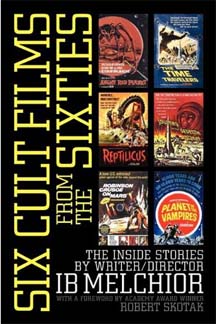Ib Came from Outer Space—The Sequel
Six Cult Films from The Sixties
by Ib Melchior
Reviewed by Brad Linaweaver
Bearmanor Media
This book was a long time coming. We've needed it for many reasons, not the least of which is setting the record straight. No one in Hollywood ever had to fight harder to get real science fiction in front of the cameras than Ib Melchior, who did everything in his film career except act (even though he began in showbiz as an actor on the stage).
 The sci-fi boom of the fifties was over. The Renaissance of science fiction films was not to begin until 1968 with 2001: A Space Odyssey, Planet of the Apes and Barbarella. Without that holy trinity there would not have been Lucas and Spielberg a decade later. After that, science fiction took over cinema worldwide as if to make up for mankind's real journey to the stars sputtering to an apparent end.
The sci-fi boom of the fifties was over. The Renaissance of science fiction films was not to begin until 1968 with 2001: A Space Odyssey, Planet of the Apes and Barbarella. Without that holy trinity there would not have been Lucas and Spielberg a decade later. After that, science fiction took over cinema worldwide as if to make up for mankind's real journey to the stars sputtering to an apparent end.
Back in the first half of the sixties, as NASA moved forward with the most important project in human history, science fiction film was in the dark valley of indifference. It was better on television with The Twilight Zone and The Outer Limits. Ib Melchior wrote for The Outer Limits. Earlier, in the 1959/60, he had written for Men Into Space. He knew something about science and engineering. He tried to bring this knowledge into his scripts at the same time that SF book writers complained that screenwriters didn't get it. Melchior got it.
Not content to be a writer in Hollywood, Melchior wanted to direct. When have we heard this before? Unlike other writers, however, he had already handled directing chores in the demanding world of live television. He was also a successful novelist whose stories were based on his own real life exploits in World War II. Basically, Melchior knew what he was doing.
So when he met egotistical blowhard Sid Pink (whose only real talent was as an exhibitor) it may not have been a marriage made in Heaven, but it would have to do. After all, the only place where the work reaches an audience is in Hell.
Purgatory is where critics and reviewers gather up their facts and voice their opinions. The foreword to this book is by Academy Award winner Robert Skotak, who is sorely missed. I received an autographed copy of his book from the long ago year of 2000 A.D.: Ib Melchior, Man of Imagination. He liked the article I did, "Ib Came From Outer Space," in Cult Movies/Spacewomen double issue (CM #26) from the even more distant year of 1998; and a review I did for Filmfax #62 of the Ed Shifres book, Space Family Robinson, detailing how Irwin Allen ripped off Lost In Space from our hero.
Given what I already knew, I was shocked in reading this new book to learn how many other times Melchior had to go through the same shit. Yet, despite everything, it was clear that this man loves every minute he's spent in making movies.
The Six Films:
THE ANGRY RED PLANET
Sid Pink produced along with Norman Maurer, but Ib got to direct as well as write the story. My father took me to see it at the drive-in. It was my second monster movie under the Florida stars. The first was The Seventh Voyage of Sinbad. My dad and I knew the monsters were not as good as the Harryhausen creations—but we appreciated the total weirdness of what was crawling around on the screen. In this book, we learn how Cinemagic came about because of the accidental cracking of a special lens. Eat your heart out Industrial Light and Magic. Who needs IMAX?
THE TIME TRAVELERS
Sid Pink did NOT produce this one. Ib directed and wrote an interesting and frequently copied story of time travel paradox. Forrest J Ackerman appeared as Technician #3. This is one of those rare science fiction films where the idea is the star. Members of Hollywood's Magic Castle should appreciate the fact that this is the only commercial movie where all the primary special effects are stage magic tricks performed right in front of the camera. Amazing! These young kids today with their damned CGI don't appreciate the pleasure of ingenuity.
REPTILICUS
Sid Pink directed this one. The rest is history.
JOURNEY TO THE SEVENTH PLANET
Sid Pink directed this one. History screamed like a tormented virgin. No, no, not again!
These two chapters are the funniest parts of the book. American International Pictures brought in Ib Melchior to help save the films from scripts he had originally written and was not allowed to direct. In a normal Hollywood situation the guy who wrote the scripts would never, ever be the guy who was brought in much later to fix the films that someone else screwed up. That's impossible. And yet it happened to Melchior. Twice! AIP was so cheap that they even turned to the writer for help.
My friend Tracy Tormé, and the late comedy genius John Candy, derived inspiration from these remarkable Sid Pink films. But they only saw the versions that AIP released after Melchior did a fix up job. Just imagine the surreal comedy Tormé and Candy could have created if they'd seen the undiluted Pink versions as lovingly described in the book under review.

ROBINSON CRUSOE ON MARS
This is one of the most important science fiction films ever made. The best article written about it is in Twenty All-Time Great Science Fictions Films by Kenneth von Gunden and Stuart H. Stock. Although Ib was not able to direct it, the project fell into the able hands of Byron Haskin. Unfortunately, in later years Haskin downplayed Melchior's contribution. That wasn't as bad as Fred Gebhardt trying to steal the writing credit at the start of the thing (shades of Irwin Allen). But none of that matters in the grand scheme. The final result is a film building a bridge from the best of the fifties sci-fi boom to the world we inhabit now.
Ib Melchior's script was only part of it. Thinking he would direct it, he created detailed storyboards of the film he envisioned. He even mapped out all the locations in Death Valley that would most resemble Mars from Ubehebe Crater to The Devil's Golf Course. Although Westerns are thought to have made the best use of Death Valley locations, the truth is that this science fiction classic tops them all.
PLANET OF THE VAMPIRES
Despite Ib's problems with other directors, he received consistent respect and support from Mario Bava. In recent years, there has been a strange reappraisal of Bava to diminish this great Italian director's contribution to horror films. Maybe it's time to give him credit for what he did to help the cause of science fiction and fantasy.
This is a good film. Never mind possible influences on Alien; what about the influence on Dancing With The Stars? The only real problem with this film has to do with the title. There are no vampires in Planet of the Vampires.
Throughout this book Melchior corrects errors in the record. In the excellent Tim Lucas book about Mario Bava, All the Colors of the Dark, Bava is reported as having had a problem with an American screenwriter on the set of the movie under discussion. Lucas suggests that writer was Melchior. Turns out it was Louis "Deke" Hayward, who would later go out of his way to set the record straight and defend Melchior. Bava never had a problem with Melchior. Poor Hayward was sent by AIP to haunt Bava's production. Just call it Planet of the Investors. Given the tidal wave of information Lucas was handling, his mistake is entirely forgivable.
Six Cult Films From The Sixties is full of little tidbits like this. Mistakes need to be cleared up. Come to think of it, two mistakes need to be cleared up regarding your immodest commentator.
The first involved an observation I made about Reptilicus in Worldly Remains #5 in which I referred to "the cartoon farmer being gobbled up by Reptilicus." What I thought was a cartoon was Melchior's eleven year old son matted into an existing shot of the puppet monster's gaping jaws. Either way, the dollhouse version of Copenhagen was in trouble.
The second mistake is to be found on page 13 of the book in a photo of Ib, Forry Ackerman and myself. For the only time in my career there has been a mistake in my favor and I hate to correct it. The example of Ib Melchior's high ethical standards is before me. In the caption, I am referred to as a Nebula Winner. Actually, I am a Nebula Finalist and Prometheus Award Winner. The Science Fiction and Fantasy Writers of America can correct this mistake by giving me a Nebula, of course.
Ib Melchior had a career before and after the sixties. In the seventies, Roger Corman's New World made a film based on one of his stories. The result was Death Race 2000. Now it has been remade in this day and age as it becomes less of a fantasy with every passing year.
Ib Melchior is an optimist. He wants the future to be better. Now that we are actually in the 21st Century, it is something of a disappointment. If we can take inspiration from a man who fought Hitler and never gave up, than the future will be bright again. Maybe we can inherit the stars after all. One cause of hope is the X-Prize Foundation, which survives no matter what happens to NASA. They helped with the first successful launch of a private space ship, Spaceship One, which had one fifth the budget of a Star Wars movie. (You remember those low budget Star Wars movies, right?)
Just how many movies could Ib Melchior make today with the budget of one blockbuster—or would he rather just take us to Mars?
|





 The sci-fi boom of the fifties was over. The Renaissance of science fiction films was not to begin until 1968 with 2001: A Space Odyssey, Planet of the Apes and Barbarella. Without that holy trinity there would not have been Lucas and Spielberg a decade later. After that, science fiction took over cinema worldwide as if to make up for mankind's real journey to the stars sputtering to an apparent end.
The sci-fi boom of the fifties was over. The Renaissance of science fiction films was not to begin until 1968 with 2001: A Space Odyssey, Planet of the Apes and Barbarella. Without that holy trinity there would not have been Lucas and Spielberg a decade later. After that, science fiction took over cinema worldwide as if to make up for mankind's real journey to the stars sputtering to an apparent end.